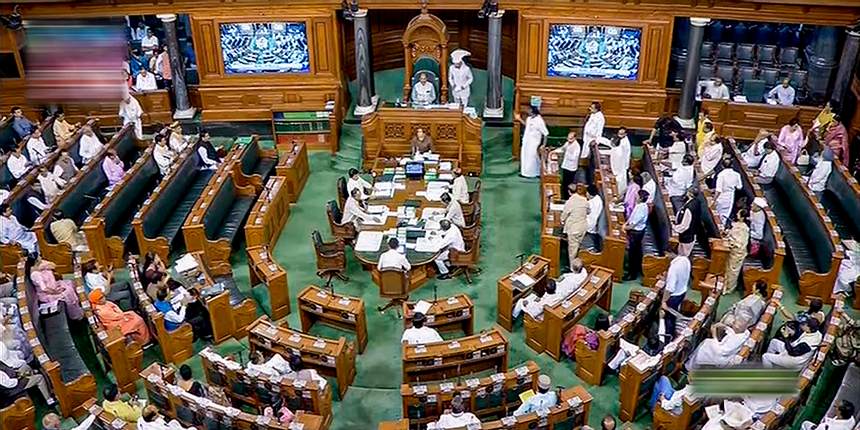National Research Foundation Bill tabled in Lok Sabha; NRF will work with UGC, DST other agencies
R. Radhika | August 4, 2023 | 03:26 PM IST | 3 mins read
The NRF Bill provides for private investment; it has the PM as board president where the NEP 2020 recommended that NRF be led by researchers.

NEW DELHI: The minister of state for science and technology, Jitendra Singh, introduced the Anusandhan National Research Foundation Bill, 2023 on Friday in Lok Sabha. Once approved in the Parliament, the Bill will establish “Anusandhan National Research Foundation”, an apex body to provide “high-level strategic direction” to scientific research and entrepreneurship in the country as per recommendations of the National Education Policy (NEP 2020).
With a budget of Rs 50,000 crore over the next five years, the NRF draws on models such as the United States’ National Science Foundation. It will replace the SERB (Science and Engineering Research Board) Act, 2008 with an expanded mandate. The Bill also paves way for public sector enterprises as well as private sector entities to invest in the activities of the foundation.
Currently, several governmental funding agencies, like the University Grants Commission (UGC), Department of Science and Technology (DST), Department of Biotechnology (DBT), Indian Council of Agriculture Research (ICAR), and along with ministries support research in their subject areas.
With this Bill, NRF will assume the position of a regulator and primary agency for research funding to “eligible persons” while the other funding agencies will continue to fund research institutes under its authority, as stated in NEP 2020. NRF will coordinate with other funding agencies and will work with science, engineering, and other academies to “avoid duplication of efforts.”
The NRF will also support research particularly at universities and colleges where research capacity is at a nascent stage, through programmes such as research and development projects, fellowships, academic chairs, and creation of centres of excellence. It will also fund “competitive peer-reviewed grant proposals” and financially assist setting up research infrastructure.
To enrich the Indian scientific ecosystem, the NRF also intends to support translation of research undertaken into capital intensive technologies while encouraging collaboration with scientists from within and outside India.
NRF composition
Since the scope of the NRF is wide-ranging – impacting all ministries - the prime minister will be the ex-officio President of the Board and the union minister of science and technology and union education minister will be the ex-officio vice-presidents.
However, this is contrary to the NEP document which states that “NRF will be governed, independently of the government, by a rotating Board of Governors consisting of the very best researchers and innovators across fields”.
According to the Bill, the governing board will be presided over by the prime minister of India, and the union minister of science and technology and education minister as the ex-officio vice-presidents.
The president of the governing board will have the powers to appoint a chief executive officer and other members and experts who have specialised knowledge in the areas of health, mathematical and physical sciences, biological sciences, engineering and technology, innovation and partnership, computer and information sciences, and engineering.
Moreover the executive committee, responsible for the day-to-day functioning of the NRF, will be headed by the principal scientific advisor - another government appointee.
NRF: Research funding
During the Union Budget 2023 announcement, the finance minister Nirmala Sitharaman allocated Rs 2,000 crore to NRF as a component of the Department of Science and Technology (DST), and not as an agency independent of the government.
The NRF, as announced by the union minister Anurag Thakur in July, will be allocated Rs 50,000 crore to be spent in five years along with a separate innovation fund of Rs 1,000 crore.
As per the Budget 2023, the ministry of science and technology had received an allocation of Rs 16,361.42 crore, with the DST receiving Rs 7,931.05 crore.
Under the NRF, the centre aims to set up four different funds which include the follow:
Anusandhan National Research Foundation Fund
Innovation Fund
Science and Engineering Research Fund
One or more Special Purpose Funds for specific projects or research
The governing body will maintain the science and engineering fund.
Central repository of research
With an aim to include research findings in policy formulation and advising the central and state governments, the NRF also intends to create a central repository, for the collection, interpretation and analysis of information and data surrounding such research.
The foundation will act as a liaison between researchers and relevant branches of government and industry, ensuring researchers are aware of the most urgent national research areas that require attention for policy formulation and implementation.
Follow us for the latest education news on colleges and universities, admission, courses, exams, research, education policies, study abroad and more..
To get in touch, write to us at news@careers360.com.